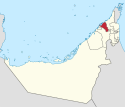Emirates of the United Arab Emirates
| Emirates of the United Arab Emirates إمارات دولة الإمارات العربية المتحدة (Arabic) | |
|---|---|
| Category | Federated state |
| Location | United Arab Emirates |
| Number | 7 Emirates |
| Populations | 72,000 (Umm Al Quwain) – 4,177,059 (Dubai) |
| Areas | 260 km2 (100 sq mi) (Ajman) – 67,000 km2 (26,000 sq mi) (Abu Dhabi) |
| Government | |
| Subdivisions |
|
The United Arab Emirates consists of seven emirates (Arabic: إمارات ʾimārāt; singular: إمارة ʾimārah), which were historically known as the Trucial States.[1] There are no internal barriers hindering movement between the emirates.
| Map | Historical Flag[2] | Emirate | Arabic name | Date joined the UAE | Capital | Population (2015)[3][4] | % of total population | Area (km2)[3] | Area (sq mi) | % of total area | Density (people / km2) |
|---|---|---|---|---|---|---|---|---|---|---|---|
 | Abu Dhabi | أبو ظبي ʾAbū dhabī | 2 December 1971 | Abu Dhabi | 2,784,490 | 26.3% | 67,340 | 26,000 | 80.55% | 41.35 | |
 | Ajman | عجمان ʿAjmān | 2 December 1971 | Ajman | 504,846 | 4.8% | 259 | 100 | 0.31% | 1,949.21 | |
 | Dubai | دبي Dubai | 2 December 1971 | Dubai | 4,177,059 | 39.5% | 3,885 | 1,500 | 4.65% | 1,075.18 | |
 | Fujairah | الفجيرة Al-Fujayrah | 2 December 1971 | Fujairah | 256,256 | 2.4% | 1,165 | 450 | 1.39% | 219.96 | |
 | Ras Al Khaimah | رأس الخيمة Raʾs al-khaimah | 10 February 1972 | Ras Al Khaimah | 416,600 | 3.9% | 1,684 | 650 | 2.01% | 247.39 | |
 | Sharjah | الشارقة Aš-Šāriqah | 2 December 1971 | Sharjah | 2,374,132 | 22.4% | 2,590 | 1,000 | 3.10% | 916.65 | |
 | Umm Al Quwain | أم القيوين ʾUmm Al-Qaywayn | 2 December 1971 | Umm Al Quwain | 72,000 | 0.7% | 777 | 300 | 0.93% | 92.66 |
| This article is part of a series on the |
| Politics of the United Arab Emirates |
|---|
 |
| |
See also
[edit]References
[edit]- ^ "United Arab Emirates | History, Culture, Population, Map, & Capital". Encyclopedia Britannica. Retrieved 31 August 2021.
- ^ Flag of United Arab Emirates – A Brief History
- ^ a b "Census 2005". Ministry of Economy and Planning, Government of the United Arab Emirates. 2005. Archived from the original on 6 November 2009. Retrieved 13 November 2009.
- ^ "Population". Dubai Online. Retrieved 12 May 2016.


 French
French Deutsch
Deutsch